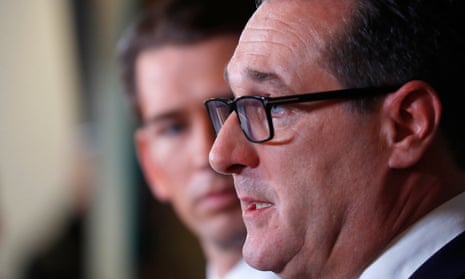Austria has become the only western European state with a far-right presence in government after its president approved a controversial coalition deal.
Alexander Van der Bellen rubber-stamped the alliance between the conservative People’s party and the far-right Freedom party on Saturday.
A previous coalition between chancellor Christian Kern’s Social Democrats and the People’s party collapsed in May, which resulted in a snap election. The latter won, but fell short of a majority.
The People’s party’s 31-year-old foreign minister, Sebastian Kurz, becomes the country’s new chancellor, and Heinz-Christian Strache, the head of the Freedom party, his deputy.
Kurz’s party will run ministries including finance, justice and agriculture, a conservative spokesman said.
The Freedom party, which is anti-immigration, will control the foreign, interior and defence ministries and others, he said.
Following meetings with Kurz and Strache, Van der Bellen said he’d been assured the new government would be pro-European. “In these talks among other things we agreed it is in the national interest of Austria to remain at the centre of a strong European Union and to actively participate in the future development of the European Union,” he said.
It is not the first time the Freedom party has been in government. It was part of a coalition government between 2000 and 2005. There was uproar at the time among EU leaders, and bilateral diplomatic relations were frozen in protest.
The response this time is likely to be more muted, given the increased support for other rightwing populist parties across Europe. Similar parties have not, however, had the same success. Marine Le Pen, the leader of France’s Front National, lost in May’s presidential election and the Dutch anti-immigration Freedom party of Geert Wilders was defeated.
Strache has moved to clean up the party’s image by suspending members for antisemitic behaviour, including a local councillor for a Nazi salute in October.
In his youth, Strache was detained at a torch-lit protest organised by a group imitating the Hitler Youth, which he now dismisses as “stupid”, but not everyone is convinced by the turnaround.
In September a group remembering Nazi camp victims published a list of what it said were at least 60 antisemitic and racist incidents involving FPO figures since 2013. “If they really changed their ideology, it is a question they can only answer themselves,” said analyst Alexandra Siegl. “I would say they changed their tactics and their strategies mainly.”
